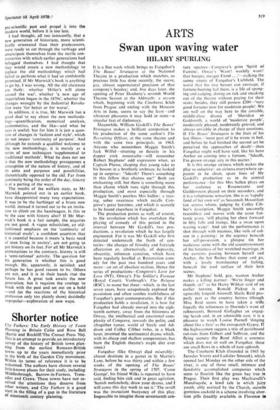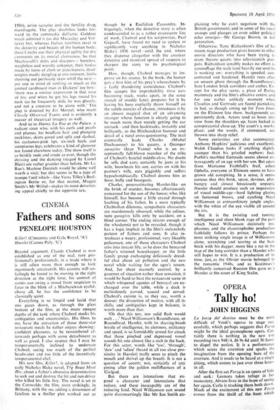ARTS Swan upon waving water
HILARY SPURLING
It is a fine week which brings us Farquhar's The Beaux' Stratagem at the National Theatre in a production which matches, as precious little has done recently, the suave, gay, almost supernatural precision of that company's heyday; and, five days later, the opening of Peter Daubeny's seventh World Theatre Season at the Aldwych: a season which, beginning with the Cinoherni Klub from Prague and ending with the Moscow Arts in June, seems to say the least—and whatever pleasures it may hold in store—a singular feat of diplomacy.
Meanwhile, William Gaskill's The Beaux' Stratagem makes a brilliant companion to his production of the same author's The Recruiting Officer, at the same theatre and with the same two principals, in 1963. Anyone who remembers Maggie Smith's Jack Wilful—strutting so fiercely in his dapper cork moustache—will remember Robert Stephens' odd expression when, as Captain Plume, clasping that young rake to his bosom in a brotherly embrace, he looked up in surprise: "Sdeath! There's something in this fellow that charms me!' Both are enchanting still, but there is something more than charm which runs right through this production, and most especially through Maggie Smith's peerless Mrs Sullen : a teas- ing, sober sweetness which recalls Con- greve's great heroines, and which is scarcely to be found elsewhere in Farquhar.
The production points as well, of course, to the revolution which has overtaken the playing of comedy of this period in the interval between Mr Gaskill's two pro- ductions, a revolution which he has largely engineered. For it was Mr Gaskill who first detected underneath the froth of cen- turies—the charges of frivolity and fairytale affectation or, alternatively, of depravity, obscenity, inhuman cynicism, which have been regularly levelled at Restoration com- edy for the past two hundred years and more—an art of absolute realism. Hence the series of productions—Congreve's Love for Love (NT), Otway's The Soldier's Fortune (Royal Court), Vanbrugh's The Relapse (RSC), to name but three—which, in the last seven years, have scrupulously explored the passionate and often sombre truthfulness of Farquhar's great contemporaries. But if this production holds a revelation, it is how far Farquhar had already moved into the eigh- teenth century, away from the bitterness of Otway, the intellectual and emotional com- plexity of Congreve, towards the polite, and altogether tamer, world of Steele and Ad- dison and Colley Cibber (who, in a black hour, invented the sentimental drama which, with its cheap and shallow compromises, has been the English theatre's staple diet ever since.) Farquhar (like Otway) died miserably: almost destitute in a garret in St Martin's Lane, before he was thirty and within a few weeks of the opening of The Beaux' Stratagem in the spring of 1707. 'Come George', his friend Wilks is reported to have said, finding him sick and in great agitation, 'banish melancholy, draw your drama, and I will come this day week to see it' The result was the insouciant buoyancy of this play. Impossible to imagine those seventeenth cen- tury spectres—Congreve's grim 'Spirit of Famine', Otway's 'Want! worldly want! that hungry, meager Fiend ...'—stalking the sunny streets of Farquhar's Lichfield. The worst that his two heroes can envisage, if fortune-hunting fail them, is a life of spong- ing and cadging, dining on tick and sneaking out of the theatre without paying for their seats; besides, they still possess £200—'very good fortunes now for moderate people'. We are well on the way here to the amiable, middle-class drama of Sheridan or Goldsmith, a world of 'moderate people', moderately pleased, moderately grieved, and always enviably in charge of their emotions. If The Beaux' Stratagem is the fruit of his last illness—`most part of it he wrote in bed, and before he had finished the second act he perceived the approaches of death'—then Farquhar might well have said, like his hero Archer on coming into a fortune, "Sdeath, I'm grown strange airy in this matter.'
It is this strange airiness which makes the play so seductive: an airiness everywhere ap- parent in he clean, spare lines of Mr Gaskill's production as in its central performance—for this Mrs Sullen plays on her audience as Rosencrantz and Guildenstern played on their recorders, and it is a voluptuous sensation. She is as 'rapidly fond of her own wit' as Susannah Mountfort (an actress whom, judging by Colley Cib- ber's description, Maggie Smith uncannily resembles) and moves with the same fan- tastic grace, 'still playing her chest forward in fifty falls and risings, like a swan upon waving water'. And yet the performance is shot through with nuances, like veils of col- our in a painting: in the urgency beneath her self-possession, a glimpse (in her malicious scene with the old countrywoman) of the bitterness of her wretched marriage, in the currents passing between herself and Archer, the hot flushes that come and go, with a lovely translucency of feeling, beneath the cool surface of their love scenes.
Mr Stephens' bold, gay, wanton Archer makes a killing partner—We're finger and thumb, sir!' as Sir Harry Wildair said of an earlier heroine. Ronald Pickup is an agreeably languid Aimwell, Sheila Reid pro- perly pert as the country heiress (though Miss Reid seems to have taken a trifle literally the references to Dorinda's want of refinement), Bernard Gallagher an engag- ing Scrub and, in an admirable cast, it is a pleasure to watch Louise Purnell 'dinging about like a fury' as the crosspatch Gypsy. If the highwaymen suggest a trio of pasteboard cut-outs from Gilbert and Sullivan, and the flying scenery (by Rend Allio) a cuteness which does not sit well on Farquhar, these are small flaws in a whole of rare aplomb.
The Cinoherni Klub (founded in 1965 by Jaroslav Vostry and Ladislav Smocek), which opened last Monday on the other side of the river, is one of those small, intimate and fiendishly accomplished companies which seem to flourish like the green bay tree in
Prague. Their first play was MachiavelLi's Mandragola, a lewd tale in which juicy youth, ably assisted by the Church, outwits gormless cuckold in a scheme involving abor- tion pills (readily available in Florence is 1504), urine samples and the fertility drug, mandragola. The play doubtless looks for- ward to the commedia dell'arte; Goldoni much admired it (as did Macaulay and Vol- taire) but, whereas Italian tumblers revel in the dexterity and beauty of the human body, these Czechs use their physical agility for dry comments on its mortal clumsiness. So that Machiavelli's dolts and sharpers— boneless, weightless and wierdly unkempt, their bodies made by turns of cloth or pipecleaners, dead- weights madly dangling at one moment, limbs shooting out perilously skew-whiff the next— put one in mind of nothing so much as the jointed cardboard man in Dickens' toy-box : 'there was a sinister expression in that nose of his; and when he got his legs round his neck (as he frequently did), he was ghastly, and not a creature to be alone with.' The play is directed by Jiri Menzel, who made Closely Observed Trains and is evidently a master of theatrical imagery as well.
And so to Danny La Rue at the Palace, a radiant siren who, with his curls and pearls and plumes, his bouffant hair and plunging necklines, skirts gored and split and slashed, his cyclamen-pink lips, six-inch heels and sumptuous legs, celebrates a kind of glamour not found elsewhere today. The show itself is as briskly rude and crude as ever, though the dressing and the dancing (staged by Lionel Blair) are rather grander than before. Mr La Rue's Marlene Dietrich would be alone well worth a visit; but this seems to be a type of trompe l'oeil which—like Vesta Tilley's Burl- ington Bertie or, for that matter, Maggie Smith's Mr Wilful—makes its most devastat- ing appeal chiefly to the opposite sex,







































 Previous page
Previous page